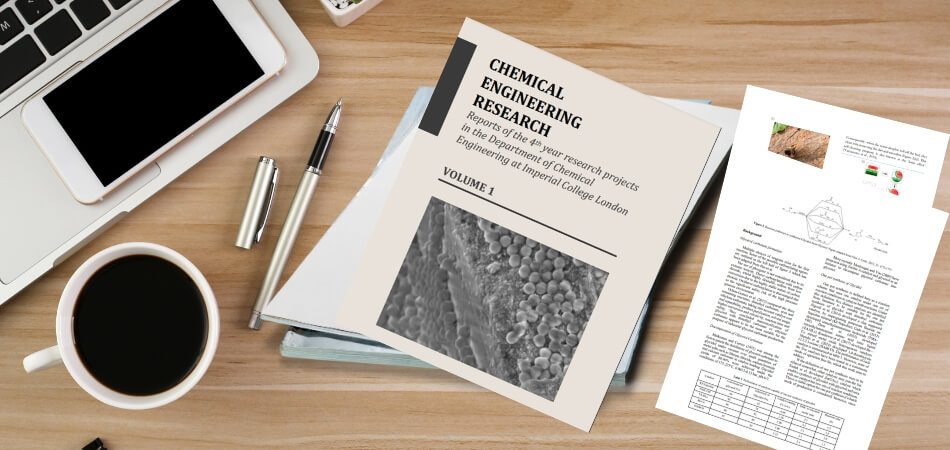A chemical engineering conference allows professionals, researchers, and academics to share their latest findings. You can gain recognition in your field by presenting a paper at such a conference. If you’re wondering how to write a paper for the chemical engineering conference, you should follow a structured format.
To write a paper for a chemical engineering conference, conduct thorough research, including an abstract, title, introduction, objectives, methods section, results, discussion of findings, conclusion, acknowledgements, and references. Ensure clarity and coherence throughout.
In this blog, we’ll guide you through each step of the process, providing tips and insights to help you write a compelling and well-structured conference paper. Follow along to learn more about creating a standout submission for your next conference.
What Makes a Good Chemical Engineering Conference Paper?
Writing a good chemical engineering paper requires careful planning and attention to detail. It’s essential to present your research clearly and concisely. A good paper starts with thorough research. Your study should be comprehensive and well-documented. A good narrative and informative paper is required for an international conference on chemical engineering to maintain the standards among peers and experts. Ensure your contribution to the field is significant and original.

Clarity in writing is essential for a good paper. Your findings should be presented in a structured and logical manner. Following the conference’s formatting guidelines ensures your paper is professionally presented. This clarity and structure help readers easily understand your research.
Proper citations and thorough experimental validation strengthen your paper. Credibility comes from referencing previous work. Validating your results through experiments ensures your finding’s reliability, which is especially important for an overseas engineering conference. These elements make your paper reliable and trustworthy.
How to Write a Paper for the Chemical Engineering Conference?
Writing a paper for a chemical engineering conference requires meticulous planning and a structured presentation. Here’s a step-by-step guide to help you through the process:
Step 1: Conduct Thorough Research
Start with extensive research on your topic. Gather relevant data and studies to support your work. This foundation ensures your paper is credible and well-informed. Detailed research and verified data will be the prerequisites of your conference paper.
Step 2: Write an Abstract
Summarize your paper in a concise abstract. Highlight the key points and findings. An effective abstract captures the essence of your research. Remember, your abstract should kick a beat of your ideas within a few words.
Step 3: Create a Title
Choose a clear and descriptive title. It should reflect the main focus of your paper. A good title attracts the right audience. You should not exaggerate too much while choosing your words for the title or create it using only a few.
Step 4: Draft the Introduction
Introduce your topic and its significance. Outline the problem and your research goals. The introduction sets the stage for your detailed findings. An eye-catching introduction will showcase to the attendees your perspective and significance of your research.
Step 5: Define Your Objectives
State the objectives of your research clearly. Explain what you aim to achieve. Well-defined objectives guide your methodology and analysis.
Step 6: Detail the Methods Section
Describe the methods you used for your research. Include experimental procedures and materials. A detailed methods section allows replication of your study. Participants will find it more accessible with extra information.
Step 7: Present Your Results
Summarize your research findings. Use charts and tables for clarity. Presenting results is crucial for learning. This is perhaps the most sensible section to highlight and present your findings.
Step 8: Discuss the Findings
Interpret the results in the discussion section. Compare them with existing studies. Discuss the implications and any unexpected outcomes.
Step 9: Write the Conclusion
Summarize the main findings in your conclusion. Highlight their importance and potential applications. A strong conclusion reinforces your paper’s contribution.
Step 10: Include Acknowledgments
Thank individuals and institutions that supported your research. Acknowledgements show appreciation and credibility. This section is brief but important.
Step 11: Add References
List all sources cited in your paper. Follow the conference’s citation style. Proper referencing ensures academic integrity and allows verification. Include strong references to add value to your research.
Benefits of Submitting a Paper to Chemical Engineering Conference
Presenting your research at a chemical engineering conference offers valuable opportunities for networking, knowledge sharing, and gaining recognition in your field. Exploring the steps to find chemical engineering conferences ensures you target the right platforms that align with your research focus and professional goals. Here are some key benefits of participating.
Showcasing Your Research
Submitting a paper allows you to present your research to a broad audience. This visibility can improve your professional reputation. It also provides an opportunity to receive feedback. Sharing your work can spark new ideas and collaborations.
Gaining Professional Recognition
Presenting at a conference can boost your professional profile. It demonstrates your commitment to advancing the field. Recognition from peers can lead to further opportunities. Being acknowledged for your work is a significant career milestone.
Networking Opportunities
Conferences provide excellent networking opportunities. You can meet other researchers, professionals, and industry leaders. Building these connections can lead to future collaborations. Networking is essential for career growth and knowledge exchange.
Receiving Constructive Feedback
Presenting your paper allows you to receive valuable feedback. Experienced professionals can offer insights and suggestions. This feedback can help refine your research. Constructive criticism is vital for professional development.
Staying Updated on Industry Trends
Attending Chemical Engineering conferences keeps you informed about the latest trends. You learn about new technologies and methodologies. Staying updated is crucial for maintaining relevance in the field. Conferences are a great source of current industry information.
Improving Your CV
Having conference presentations on your CV is impressive. It shows you are actively engaged in the field. This can be advantageous for job applications and promotions. An improved CV reflects your dedication and expertise.
Contributing to The Scientific Community
Submitting a paper contributes to the broader scientific community. Your research can inspire others and advance the field. Sharing knowledge is fundamental to scientific progress. Your contribution can have a lasting impact.
Chemical engineering conferences offer numerous benefits. Engaging the professional community encourages innovation. Advance your career and contribute to the field with these benefits. To participate, make sure you meet the conference participation eligibility criteria, which often include having a relevant academic or professional background.
Common Mistakes to Avoid While Writing Chemical Engineering Papers
Writing a chemical engineering paper requires attention to detail and adherence to guidelines. Avoiding common mistakes can improve the quality of your paper. Here are some pitfalls to watch out for and how to avoid them.
Inadequate Research
Inadequate research weakens your paper’s foundation. Ensure thorough investigation of relevant literature and studies. Lack of in-depth research results in incomplete or inaccurate information. Strong research supports your arguments and findings.
Poor Structure
A poorly structured paper confuses readers. Follow the recommended format, including abstract, introduction, methods, results, discussion, and conclusion. Each section should flow logically into the next. The clear structure increases readability and comprehension.
Lack of Clarity
Clarity is crucial in scientific writing. Avoid jargon and overly complex sentences. Ensure your ideas are expressed simply and precisely. Clear writing helps convey your findings effectively.
Insufficient Data Analysis
Insufficient data analysis undermines your results. Provide thorough analysis and interpretation of data. Use appropriate statistical methods to support your conclusions. Well-analyzed data strengthens the validity of your research.
Inaccurate Citations
Accurate citations are essential for academic integrity. Follow the correct citation style consistently. Cite all sources used in your research. Proper citations acknowledge others’ work and avoid plagiarism.
Who Can Write a Paper for a Chemical Conference?
Anyone involved in research or professional work related to the field of chemical engineering can write a paper for a chemical conference. More specifically professors, research scientists, industry professionals, chemical engineers, collaborative teams, independent researchers, and professionals from related fields are ideal participants for chemical engineering conferences who can write papers on their research and findings. Here are the key groups of individuals who typically contribute papers.
1. Researchers and Academics
Professors, Postdoctoral Researchers, and Research Scientists from universities and research institutions often write papers to share their latest findings. They contribute to advancing the field by presenting novel research, methodologies, or theories. Graduate and Undergraduate Students involved in research projects, often under the supervision of a faculty member, can also submit papers. This is a great opportunity for students to gain experience in scientific communication and to receive feedback from peers.
2. Industry Professionals
Chemical Engineers, Process Engineers, and Scientists working in industry sectors like pharmaceuticals, petrochemicals, food processing, and environmental services can write papers on applied research, case studies, innovations, and practical solutions to industry challenges. Technical Experts and Consultants who specialize in specific areas of chemical engineering may contribute papers on their applied research, new technologies, or advanced solutions to engineering problems.
3. Collaborative Teams
Multi-disciplinary Teams consisting of individuals from academia, industry, and government labs often collaborate on research that bridges theory and practical application. These teams can produce comprehensive papers that reflect both academic insights and real-world applications.
4. Government and Regulatory Researchers
Scientists and Engineers from Government Agencies and Regulatory Bodies may write papers on regulatory science, safety standards, environmental impacts, and policy-related research that is crucial to the field of chemical engineering.
5. Startups and Entrepreneurs
Founders and Researchers from Startups in the chemical engineering space can write papers to showcase new technologies, innovative products, or disruptive processes that have potential commercial applications.
6. Independent Researchers
Independent Scholars and Practitioners who conduct research outside of formal academic or corporate settings can also contribute. They may present novel ideas, unconventional approaches, or independent studies relevant to the field.
Frequently Asked Questions (FAQs)
Writing a paper for a chemical engineering conference can be a challenging yet rewarding task. Here are some frequently asked questions and their answers to help guide you through the process.
How Do I Structure the Introduction?
The introduction should introduce your topic and its significance. Outline the problem and your research goals. This section sets the stage for your detailed findings.
What Are the Key Elements of The Methods Section?
Describe the methods you used for your research, including experimental procedures and materials. This section should be detailed enough to allow replication of your study. Clear methodology increases the credibility of your paper.
What Is Important in The Discussion Section?
Interpret the results in the discussion section, comparing them with existing studies. Discuss the implications and any unexpected outcomes. This analysis is vital for contextualizing your findings.
How Do I Write a Strong Conclusion?
Summarize the main findings in your conclusion, highlighting their importance and potential applications. A strong conclusion reinforces your paper’s contribution. It leaves a lasting impression on the reader.
How Should I Handle Citations and References?
List all sources cited in your paper, following the conference’s citation style. Proper referencing ensures academic integrity and allows verification. Accurate citations acknowledge others’ work and avoid plagiarism.
Bottom Line
Submitting a paper to a chemical engineering conference offers numerous professional benefits, from showcasing your research to improving your CV. You gain recognition and valuable feedback by presenting your findings. Networking opportunities at these conferences can lead to future collaborations and career growth.
Learning how to write a paper for the chemical engineering conference is crucial for making a significant impact. Start with thorough research, follow a structured format, and ensure clarity and coherence throughout your paper. Avoid common mistakes like inadequate research and poor structure to increase the quality of your submission.
Engaging with the professional community at these conferences not only advances your career but also contributes to the broader scientific field. By sharing your research, you help inspire others and drive innovation. Take advantage of these opportunities to grow professionally and make a lasting contribution to chemical engineering.







